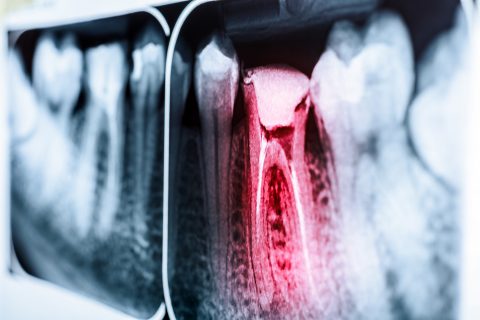When bacteria penetrate the centre of the tooth called the pulp, it can become inflamed and infected, causing pain. Without treatment the blood vessels and nerves inside the tooth become severely infected forming pus or an abscess that can spread to your jaw or sinus. In the past, teeth with damaged pulps were removed. Today, root canal treatment has provided dentists with a safe solution for saving the tooth and maintaining your natural smile.
Root Canal Treatment
Root Canal Treatment
What is involved during root canal treatment?
At High Street Dental, the treatment is generally done over several visits. Your dentist may prescribe you antibiotics and pain killers during your treatment. Each visit would generally involve numbing of the tooth and multiple x-rays to monitor the tooth and progress of the treatment. The first visit involves the dentist removing the damaged or infected nerve tissue and filling the infected root with an antibiotic to treat any remaining infection. The second visit would routinely involve, shaping the canals with fine dental instruments, to receive filling material. During the third visit, the tooth root is packed with bio-inhert filling material and a temporary filling material placed. The final restoration would be done after several weeks, once the tooth is confirmed to be asymptomatic. To ensure the longevity of the weakened tooth, a crown is recommended.
Depending on the severity of infection and progress of your tooth, at times your dentist may choose to combine various stages of the treatment into one visit or you may need additional visits.
What are the signs you may need root canal treatment?
The most common indicators of a serious problem in your teeth are high sensitivity to hot or cold temperatures and pain or swelling in your gums. However, some patients never experience any obvious symptoms, which is why it’s imperative to have regular check-ups every six months and receive quality dental services in a timely manner.
If you are experiencing any of the following symptoms, contact us for a full diagnosis:
Does root canal treatment hurt?
A root canal procedure can sound scary but with today’s technology its typically not a whole lot more than having a deep filing. You will not feel any pain as the procedure is only done when the tooth has been completely numbed. However, we understand you may feel a little anxious or nervous about the procedure. If this is the case for you, please talk to one of our dentists who will be able to talk you through the treatment options.
After your root canal treatment your tooth may be sore or tender. This is a normal symptom of your body’s healing process and usually lasts only a few days following your treatment.
How much does it cost?
Costs depend on the complexity of the problem and the tooth affected. Molar teeth generally cost more due to having more roots, therefore are more difficult to treat. It is best to ask your dentist for an accurate quote during a consultation appointment.
To learn more about root canal therapy or if you have any questions please call us on (03) 9852 1717
Need to speak with us? Call (03) 9852 1717
Or contact us by filling out the form below


